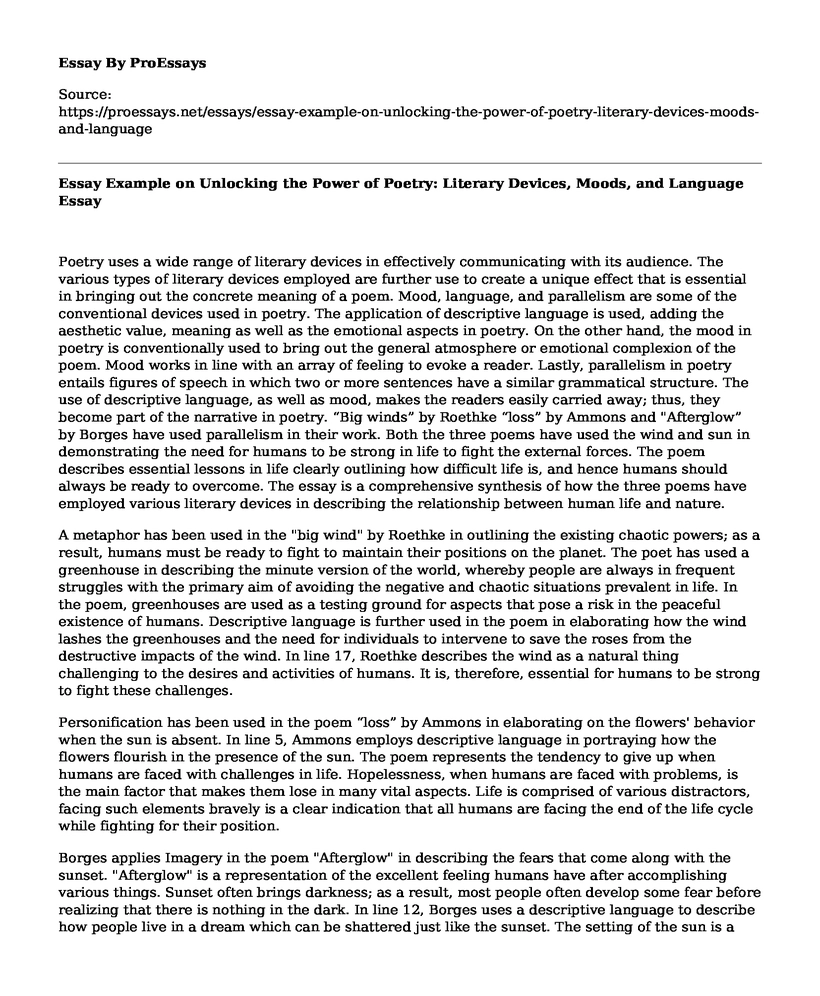Poetry uses a wide range of literary devices in effectively communicating with its audience. The various types of literary devices employed are further use to create a unique effect that is essential in bringing out the concrete meaning of a poem. Mood, language, and parallelism are some of the conventional devices used in poetry. The application of descriptive language is used, adding the aesthetic value, meaning as well as the emotional aspects in poetry. On the other hand, the mood in poetry is conventionally used to bring out the general atmosphere or emotional complexion of the poem. Mood works in line with an array of feeling to evoke a reader. Lastly, parallelism in poetry entails figures of speech in which two or more sentences have a similar grammatical structure. The use of descriptive language, as well as mood, makes the readers easily carried away; thus, they become part of the narrative in poetry. “Big winds” by Roethke “loss” by Ammons and "Afterglow” by Borges have used parallelism in their work. Both the three poems have used the wind and sun in demonstrating the need for humans to be strong in life to fight the external forces. The poem describes essential lessons in life clearly outlining how difficult life is, and hence humans should always be ready to overcome. The essay is a comprehensive synthesis of how the three poems have employed various literary devices in describing the relationship between human life and nature.
A metaphor has been used in the "big wind" by Roethke in outlining the existing chaotic powers; as a result, humans must be ready to fight to maintain their positions on the planet. The poet has used a greenhouse in describing the minute version of the world, whereby people are always in frequent struggles with the primary aim of avoiding the negative and chaotic situations prevalent in life. In the poem, greenhouses are used as a testing ground for aspects that pose a risk in the peaceful existence of humans. Descriptive language is further used in the poem in elaborating how the wind lashes the greenhouses and the need for individuals to intervene to save the roses from the destructive impacts of the wind. In line 17, Roethke describes the wind as a natural thing challenging to the desires and activities of humans. It is, therefore, essential for humans to be strong to fight these challenges.
Personification has been used in the poem “loss” by Ammons in elaborating on the flowers' behavior when the sun is absent. In line 5, Ammons employs descriptive language in portraying how the flowers flourish in the presence of the sun. The poem represents the tendency to give up when humans are faced with challenges in life. Hopelessness, when humans are faced with problems, is the main factor that makes them lose in many vital aspects. Life is comprised of various distractors, facing such elements bravely is a clear indication that all humans are facing the end of the life cycle while fighting for their position.
Borges applies Imagery in the poem "Afterglow" in describing the fears that come along with the sunset. "Afterglow" is a representation of the excellent feeling humans have after accomplishing various things. Sunset often brings darkness; as a result, most people often develop some fear before realizing that there is nothing in the dark. In line 12, Borges uses a descriptive language to describe how people live in a dream which can be shattered just like the sunset. The setting of the sun is a representation of the people’s dreams that could disappear in darkness hence causing a lot of stress. The poems are a representation of some real-life experiences. Conventionally, in life, people expect their lives to be beautiful; however, their paths may not always be bright due to the constant challenges encountered. Conclusively, both the poems have used a motivational mood with the primary aim of encouraging the readers to continually strive towards reaching their dreams while avoiding distractors that come along their way. The poems are an inspiration for how humans can achieve victory through overcoming existing challenges.
Cite this page
Essay Example on Unlocking the Power of Poetry: Literary Devices, Moods, and Language. (2023, Sep 04). Retrieved from https://proessays.net/essays/essay-example-on-unlocking-the-power-of-poetry-literary-devices-moods-and-language
If you are the original author of this essay and no longer wish to have it published on the ProEssays website, please click below to request its removal:
- Compare and Contrast Essay on Oedipus the King and Hamlet
- Essay Sample on Personification in Literature
- Essay Example on My Son Blazes Within Me: Exploring Family, Spirituality & More
- The Tone and Style of Kate Chopin's Story of an Hour
- Essay Example on Climbing the Second Mountain: A Guide to Living a Meaningful Life
- Essay Sample on A Dollhouse's Feminist Aspects: Effects on Marriage & Social Relations
- Essay Example on Comparing Wordsworth and Sidney: Sleep Poems







